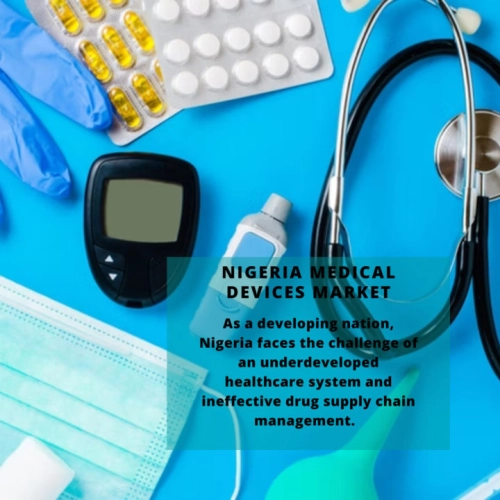
- Get in Touch with Us

Last Updated: Apr 25, 2025 | Study Period: 2024-2030
A medical device can be instrument, apparatus, tool, machine, appliance, implant, in vitro reagent, software, substance, or other similar or related item that is intended by the manufacturer to be used, either alone or in combination, for a medical purpose.
Nigeria's healthcare system is grossly underdeveloped and unable to satisfy local demands. Major cities are home to much of the healthcare infrastructure, and residents of metropolitan regions have four times more access to healthcare than residents in other locations.

The private healthcare industry is very fragmented, with a large number of little, doctor-owned medical practices.
The Nigeria Medical Devices Market accounted for $XX Billion in 2023 and is anticipated to reach $XX Billion by 2030, registering a CAGR of XX% from 2024 to 2030.
As a developing nation, Nigeria faces the challenge of an underdeveloped healthcare system and ineffective drug supply chain management.
This has been a major concern in the treatment of diseases and a major barrier to the achievement of universal health coverage and Sustainable Development Goal 3, which aims to ensure healthy lives and well-being for all.
Uninterrupted access to medicine increases the likelihood that population health outcomes will be improved, making it a crucial component of effective healthcare systems.
In Nigeria, the lockdown that was accompanied by border closures and a prohibition on cross-state movement caused a considerable decrease in the stock of necessary medicines in the medical facilities, making it challenging for patients to obtain the medications they require.
Additionally, due to the COVID-19 pandemic, the cost of medications, hand sanitizers, face masks, personal protective equipment, and other medical supplies used in healthcare has increased.
| Sl no | Topic |
| 1 | Market Segmentation |
| 2 | Scope of the report |
| 3 | Abbreviations |
| 4 | Research Methodology |
| 5 | Executive Summary |
| 6 | Introduction |
| 7 | Insights from Industry stakeholders |
| 8 | Cost breakdown of Product by sub-components and average profit margin |
| 9 | Disruptive innovation in the Industry |
| 10 | Technology trends in the Industry |
| 11 | Consumer trends in the industry |
| 12 | Recent Production Milestones |
| 13 | Component Manufacturing in US, EU and China |
| 14 | COVID-19 impact on overall market |
| 15 | COVID-19 impact on Production of components |
| 16 | COVID-19 impact on Point of sale |
| 17 | Market Segmentation, Dynamics and Forecast by Geography, 2024-2030 |
| 18 | Market Segmentation, Dynamics and Forecast by Product Type, 2024-2030 |
| 19 | Market Segmentation, Dynamics and Forecast by Application, 2024-2030 |
| 20 | Market Segmentation, Dynamics and Forecast by End use, 2024-2030 |
| 21 | Product installation rate by OEM, 2023 |
| 22 | Incline/Decline in Average B-2-B selling price in past 5 years |
| 23 | Competition from substitute products |
| 24 | Gross margin and average profitability of suppliers |
| 25 | New product development in past 12 months |
| 26 | M&A in past 12 months |
| 27 | Growth strategy of leading players |
| 28 | Market share of vendors, 2023 |
| 29 | Company Profiles |
| 30 | Unmet needs and opportunity for new suppliers |
| 31 | Conclusion |
| 32 | Appendix |